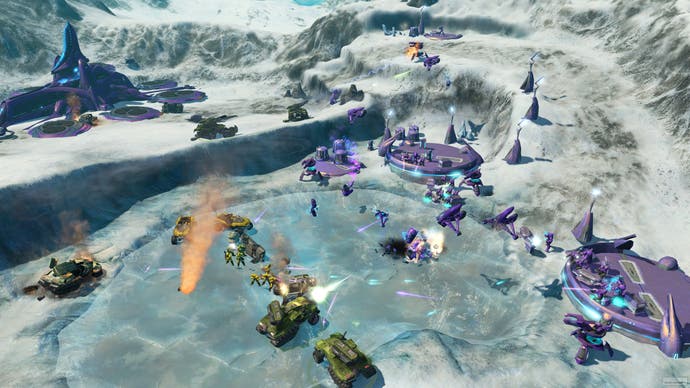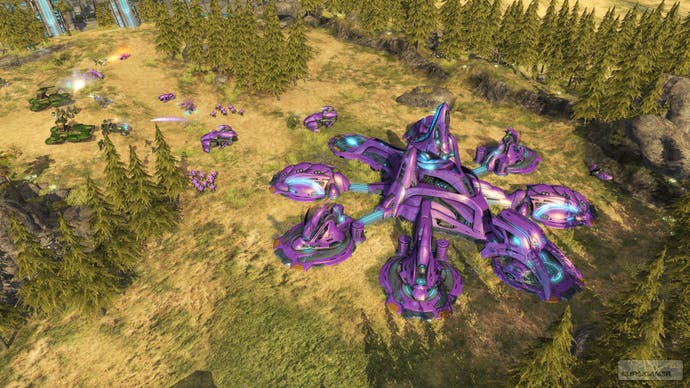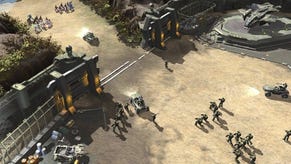Halo Wars
Warthogs and all.
All of which is to say that, as an asymmetrical wargame, Halo Wars performs well. The two sides are both authentically different to one another and offer different challenges which are entertaining to master. It's still too early to talk about absolute balance, but it certainly leads to interesting interactions.
The higher-level choices are fun too. Outside of the campaign, you get to choose which of six commanders you take into action, and these alter your abilities. On the UNSC side, you get a different unique unit, assorted bonuses (e.g. starting with upgrading production centres, easier research, etc.) and an orbital-bombardment side ability. For the Covenant, you get a different specialist unit and get to actually take your leader onto the battlefield. So, rather than the timer-recharging orbital-blasts of the UNSC, your leaders can get involved and use their high-level powers as long as you have resources to fire and they're not dead. The Arbiter's Rage ability, for example, allows you to take manual control of him in the manner of flawed not-classic Rise and Fall, like a mini-game button-basher. It's a rare example of something that a strategy aficionado could describe as an obvious console influence.
If the two main sides are great, it's the third which causes problems. The Flood, turning up in the campaign proper as an antagonist, just doesn't work as an RTS opponent. When everyone's a big old mob, a mob of icky creatures doesn't cut it. Their end-of-the-world-oh-no! nature is basically absent, and in an example of the game's faithfulness not really working out, their pallid yellow colouring means it's difficult to pick them out of the scenery in desert levels.
Bar that, the campaign is smart collection of missions with fine variations on the whole RTS theme. (The missions that have a splash of tower-defence are a good example. The one where an immobilised Scarab plays sentry, with you trying to manoeuvre closer without being destroyed, is another). While not exactly long - expect to get through it in about the time it takes you to play through its FPS-brother's campaign - the fifteen missions are designed to be replayed. Firstly, they're short enough to do so. Secondly, medals - from Tin to Gold - are awarded depending on how well you do, and there are the Halo-traditional four difficulty levels to wrestle.

Aiding this is the game's co-operative mode, which allows two people to play any of the missions - or the whole campaign - together. And that's literal. As in, you both control the same base. Whatever troops you tell your base to make, you get, or can gift to your comrade in arms. In terms of actual research and base-management, you both get to spend the same money however you want. Expect lots of rows akin to co-habiting couples of the "You Spent The Rent Money On Games Workshop Skaven?" variety when someone spends all the resources on something the other player considers stupid. In other words, while fun, it seems a sideshow compared to the intricate conflict the multiplayer and skirmish allow.
The other main reservation is that areas other strategy games have explored well are a little more vestigial here - for example, the ability for infantry to take cover in the occasional defensive structure. Where something like Company of Heroes - or even C&C - made claiming and holding them a key part of the strategy with specific counters against troops in hiding, here they're just dropped in so sporadically they feel like an idea Ensemble integrated then never really developed. And while there's detail to consider with the special abilities, a lot of the game does operate in the simple manner of selecting all and then clicking on something to do or kill.

But then, while the original Halo FPS took many of the best PC innovations in the genre leading up to its release and made a game that seemed native to its new format, and genuinely new, Halo Wars clearly isn't doing that. It's a console RTS that thinks the genre was fundamentally fine the way it was. It's happy with that classical design. All it's interested in is making that fly on the 360, and, on that level, you have to consider Halo Wars a genuine success. I can't think of any console RTS that has achieved that seemingly-simple objective as well as Ensemble's final flourish.
As a developer that always seemed most interested in plain craftsmanship, it's a suitable capstone. As a return to one of the 360's most popular universe, it's about as good an RTS as a Halo fan could expect. And as a game, Halo Wars is a genuine pleasure.







